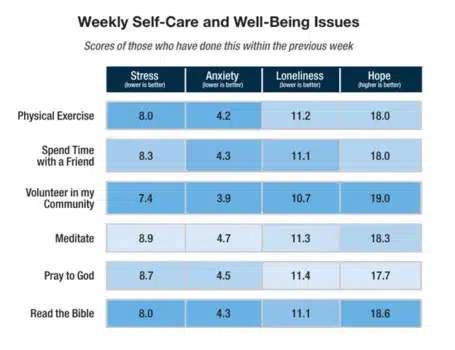Reading the Bible has better self-care outcomes than exercising, meditating or spending time with friends, the American Bible Society said in the latest release of its 15th annual State of the Bible.
In drawing their conclusions, researchers considered how the common self-care activities of exercising, spending time with a friend, volunteering in one’s community, meditating and praying to God impact stress, anxiety, loneliness and hope, compared to how Scripture reading impacts such feelings.
While Scripture-engaged individuals participated in all of the common self-care activities — except exercise — more frequently than non-Scripture-engaged individuals, researchers found a positive impact on stress, anxiety, loneliness and hope from Bible reading, the ABS said in releasing its findings.
 “Our research confirms that all the things that people do to improve their general well-being — exercise, seeing friends, and so on — are statistically associated with fuller lives. So is Bible reading,” said John Plake, ABS chief innovation officer and editor-in-chief of the State of the Bible series. “In fact, the Bible’s connection to lower stress, anxiety, and loneliness is stronger than that of meditation, spending time with a friend or even exercise.”
“Our research confirms that all the things that people do to improve their general well-being — exercise, seeing friends, and so on — are statistically associated with fuller lives. So is Bible reading,” said John Plake, ABS chief innovation officer and editor-in-chief of the State of the Bible series. “In fact, the Bible’s connection to lower stress, anxiety, and loneliness is stronger than that of meditation, spending time with a friend or even exercise.”
Results were judged on a scale of 0–40 for stress, 0–20 for anxiety, and 5-20 for loneliness, with lower numbers better; and 3-24 for hope, with higher numbers better. As such, those who read the Bible weekly or more experienced stress levels of 8, compared to 9.6 for those who didn’t read Scripture; anxiety registered 4.3 among readers compared to 4.8 for non-readers; those who read the Bible at least weekly registered 11.1 in loneliness, compared to 11.8 among non-readers; and readers registered 18.6 on the hope scale, compared to 16.8 for non-readers.
“Those who keep coming back to Scripture find reassurance in stressful times, hope for the future,” Plake said, “and a growing relationship with the God who knows them intimately and loves them deeply.”
Scripture reading helped study participants during challenging times in their lives, with 94 percent of participants saying reading the Bible daily helps them know that God cares deeply about their suffering, compared to 53 percent of those who read the Bible only monthly.
Common self-care activities also helped adults included in the study, but few outcomes were better than those from Scripture reading. Volunteering achieved better stress outcomes at 7.4, better anxiety outcomes at 3.9, better loneliness outcomes at 10.7, and more hope at 19.0. Concurrently, Scripture engagement drives volunteerism, researchers revealed in earlier releases of the annual study. But because volunteers are also far more likely to come from the Boomer-plus generation, which scores better in the various wellbeing categories, researchers said the results could be somewhat skewed.
“The relatively few (17 percent) who volunteer in their communities put up the most positive numbers,” researchers wrote. “They are the least stressed, least anxious, least lonely and most hopeful of everyone represented on these charts.”
Researchers encourage Bible reading as a proven self-care practice.
“As the anchoring element of soul care, the Bible opens us up to a transformative interaction — a relationship — with God,” researchers wrote.
Research findings are gleaned from a nationally representative survey performed for ABS by NORC at the University of Chicago, using their AmeriSpeak panel. The data came from 2,656 online interviews conducted Jan. 2-21 with American adults in all 50 states and the District of Columbia.
— Diana Chandler is Baptist Press’ senior writer.
